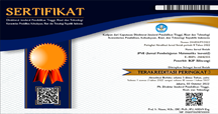PERSEPSI SISWA TERHADAP PEMBELAJARAN MATEMATIKA SECARA DARING DENGAN MENGGUNAKAN LMS MOODLE SELAMA PANDEMI COVID-19
DOI:
https://doi.org/10.22460/jpmi.v5i2.10016Keywords:
Mathematics Education, Moodle, Online LearningAbstract
The significant influence of the Covid-19 pandemic on the education sector has changed the learning process from face-to-face to online learning. One of the tools used in optimizing the online learning process is the Moodle Learning Management System (LMS). Students' perception of moodle becomes data that is analyzed and interpreted during online learning of mathematics. There are 18 question items distributed via google form using a semantic differential scale of 1-7. Several aspects are examined from the questionnaire, including affective, cognitive and behavioural elements to students in SMP X, data analysis technique by calculating the average of each statement item with the criteria of an average score of <5 Negative response and an average score of 5 then the indicator has a positive response. In addition, the total percentage of students who fill out each indicator is also analyzed to compare the proportions. The data obtained from this study include the affective element of students choosing the benefits of LMS Moodle on a scale of 5-7 by 76%. From the cognitive element of students' perceptions, from 5-7, as many as 68% of students were motivated to learn to use the Moodle LMS during the Covid-19 pandemic. And from the behavioural aspect, 82% of students choose from a scale of 5-7 they choose the emergence of learning independence when using this Moodle LMS.
References
Black, E. W., Beck, D., Dawson, K., Jinks, S., & Dipietro, M. (2007). The other side of the LMS: Considering implementation and use in the adoption of an LMS in online and blended learning environments. TechTrends, 51(2), 35–39. https://doi.org/10.1007/s11528-007-0024-x
Herayanti, L., Fuaddunnazmi, M., & Habibi, H. (2017). Pengembangan Perangkat Pembelajaran Fisika Berbasis Moodle. Jurnal Pendidikan Fisika Dan Teknologi, 3(2), 197–206. https://doi.org/10.29303/jpft.v3i2.412
Hines, M. G., & Lynch, R. (2019). The Relationship Of Grade 7 Students’ General Ict Use And Attitudes Towards Ict Use For School Related Activities With Ict Self-Efficacy In Eleven English Program Schools Of Thailand. Scholar : Human Sciences, 11(2), 366. https://www.proquest.com/scholarly-journals/relationship-grade-7-students-general-ict-use/docview/2384107334/se-2
Hubalovsky, S., Hubalovska, M., & Musilek, M. (2019). Assessment of the influence of adaptive E-learning on learning effectiveness of primary school pupils. Computers in Human Behavior, 92, 691–705.
Kadarisma, G., Senjayawati, E., & Amelia, R. (2019). Pedagogical Content Knowledge Pre-Service Mathematics Teacher. Journal of Physics: Conference Series, 1315(1). https://doi.org/10.1088/1742-6596/1315/1/012068
Kadarisma, Gida, & Ahmadi, Y. (2019). Pelatihan Penggunaan Media Pembelajaran Berbasis ICT Kepada Guru Sekolah Dasar. Amal Ilmiah : Jurnal Pengabdian Kepada Masyarakat, 1(1), 35–40.
Kamaruddin, E., Sulaeman, E., Nurita, L., & Ningtyas, L. D. (2021). Implementation of Moodle e-learning in Mathematics. IOP Conference Series: Materials Science and Engineering, 1098(2), 022098. https://doi.org/10.1088/1757-899x/1098/2/022098
Laster, S. (2010). Model-driven design: Systematically building integrated blended learning experiences. Journal of Asynchronous Learning Network, 14(1), 39–53. https://doi.org/10.24059/olj.v14i1.1637
Marhento, G. (2015). Efektivitas Pembelajaran Kontekstual dalam Mengajarkan Matematika. Formatif: Jurnal Ilmiah Pendidikan MIPA, 1(3). https://doi.org/10.30998/formatif.v1i3.73
Masrul, Leon A. Abdillah, N. (2020). Social Distancing dan Budaya Kita. Pandemik COVID-19 Persoalan Dan Refleksi, May, 39–47. https://www.researchgate.net/publication/341218892
Portnov-Neeman, Y., & Barak, M. (2013). Exploring Students’ Perceptions about Learning in School: An Activity Theory Based Study. Journal of Education and Learning, 2(3), 9–25. https://doi.org/10.5539/jel.v2n3p9
Riedy, M., Yu, J., & Zhou, J. (2012). Effect of Teaching Method on Students ’ Perceptions of Instructor Attributes. Advances in Business Research, 3(1), 141–146.
Saputra, I. D. (2016). Pengaruh Persepsi Terhadap Prestasi Belajar Matematika pada Siswa Kelas VIII SMP/MTs Se-Kecamatan Gombong Kabupaten Kebumen Tahun Pelajaran 2015/2016. Universitas Muhammadiyah Purworejo.
Sitanggang, K. (2016). Domain Afektif dalam Pembelajaran Matematika. Universitas Sumatera Utara.
Susmiati, E. (2020). Meningkatkan Motivasi Belajar Bahasa Indonesia Melalui Penerapan Model Discovery Learning dan Media Video Dalam Kondisi Pandemi Covid-19 bagi Siswa SMPN 2 Gangga. Jurnal Paedagogy, 7(3), 210. https://doi.org/10.33394/jp.v7i3.2732
Warsita, B. (2011). Pendidikan Jarak Jauh. PT Remaja Rosdakarya.
Watnaya, A. kusnayat, Muiz, M. hifzul, Nani Sumarni, Mansyur, A. salim, & Zaqiah, Q. yulianti. (2020). Pengaruh Teknologi Pembelajaran Kuliah Online Di Era Covid-19 Dan Dampaknya Terhadap Mental Mahasiswa. EduTeach : Jurnal Edukasi Dan Teknologi Pembelajaran, 1(2), 153–165. https://doi.org/10.37859/eduteach.v1i2.1987
Yamin, M. (2012). Desain Baru Pembelajaran Kontruktivistik. Referensi.

















